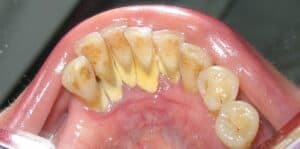No matter how well you care for your teeth, you always have bacteria in your mouth. Bacteria in the mouth can begin to form a layer on the teeth with proteins and other foods. This formed layer covers your teeth, builds up at the gumlines, and starts to enter the gums, reaching the fillings and other operations done on the teeth. These layers cause cavities that damage the tooth enamel and allow bacteria to settle in these areas. Regular cleaning of the teeth helps prevent permanent tooth decay and gum disease. When these layers formed in the tooth are not cleaned, they harden and become tartar, causing much bigger problems in the teeth.
Dental tartar, also known as tartar, can occur in the gum line, upper part, and even below. Dental tartar is hard and porous. They can easily cause gum recession and other gum diseases. When tartar occurs, the only thing that can be done is to remove it with a dentist examination with special tools and techniques; you should trust only a dentist who is an expert in the field.

How Do Dental Tartars Affect Oral Health?
Dental tartar causes tooth decay because they prevent correct brushing of the teeth and the effective use of dental floss. Dental tartar formed at the gum line is extremely dangerous for oral health. Because the bacteria in the tartar irritate and damage the gums. Over time, this irritation and damage cause major gum diseases.
Gingivitis is one of the mildest gum diseases. If you brush your teeth at the proper intervals, use dental floss, and clean them regularly with an antiseptic mouthwash, these diseases can be stopped, and even it may be possible to get rid of this disease entirely with the treatment of a specialist dentist.
If these procedures are not performed, the accumulation of tartar between the gums and teeth may cause bacteria to form and increase the risk of infection. In these diseases called periodontitis, the immune system secretes some chemicals to fight infections in the gum line, and these chemicals, mixed with bacteria, cause tiny pocket-like formations in the gum line. Bacteria and chemicals accumulated in these little pockets begin to damage the tooth bones and tissues. Gingival diseases may also occur due to heart disease or other health problems.
Controlling Dental Tartar
Once encountered with dental tartar, it is tough to get rid of it completely, and in the process, dental tartar continues to impair oral health. Therefore, knowing what should be done to avoid dental tartar is necessary.
•Brush your teeth regularly for 2 minutes twice a day.
•Even if it is done twice a day, short-term tooth brushing does not affect the risk of dental tartar.
•Get a toothbrush with soft bristles that can reach teeth in even the narrowest areas.
•Electric toothbrushes are much more effective than standard brushes in cleaning teeth properly.
• Prefer toothpaste that contains fluoride and provides tartar control. In particular, the triclosan substance, which has a high power to fight bacteria accumulated in the teeth, should be in your toothpaste.
• No matter how well you brush your teeth, reaching the areas between the teeth is not easy. Never skip flossing to make sure the spaces between the teeth are clean.
•Use an antiseptic mouthwash daily to help kill the bacteria that cause the plaque.



